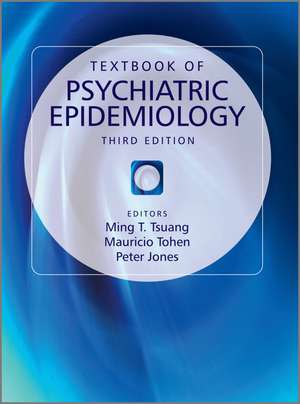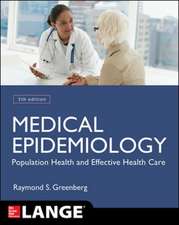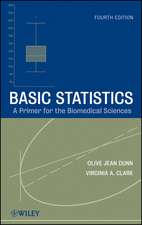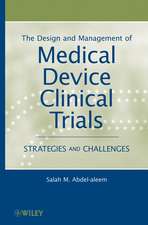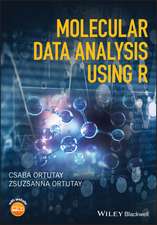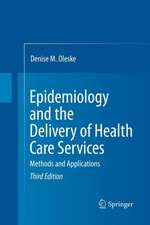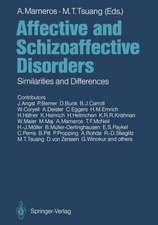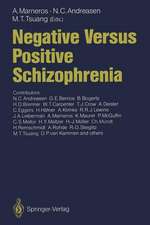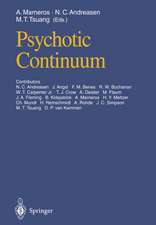Textbook of Psychiatric Epidemiology 3e
Autor MT Tsuangen Limba Engleză Hardback – 17 apr 2011
Preț: 2304.25 lei
Preț vechi: 2425.52 lei
-5% Nou
Puncte Express: 3456
Preț estimativ în valută:
440.99€ • 458.07$ • 366.30£
440.99€ • 458.07$ • 366.30£
Carte tipărită la comandă
Livrare economică 03-17 februarie 25
Preluare comenzi: 021 569.72.76
Specificații
ISBN-13: 9780470694671
ISBN-10: 047069467X
Pagini: 660
Dimensiuni: 193 x 250 x 37 mm
Greutate: 1.54 kg
Ediția:3rd Edition
Editura: Wiley
Locul publicării:Chichester, United Kingdom
ISBN-10: 047069467X
Pagini: 660
Dimensiuni: 193 x 250 x 37 mm
Greutate: 1.54 kg
Ediția:3rd Edition
Editura: Wiley
Locul publicării:Chichester, United Kingdom
Public țintă
Psychiatric epidemiologists, GPs, psychiatry residents, medical students, and graduate of epidemiology, psychology and allied mental health disciplinesCuprins
List of Contributors. 1 Introduction to epidemiologic research methods (Glyn Lewis). 2 Analysis of categorical data: The odds ratio as a measure of association and beyond (Garrett M. Fitzmaurice and Caitlin Ravichandran). 3 Genetic epidemiology (Stephen V. Faraone, Stephen J. Glatt and Ming T. Tsuang). 4 Examining gene-environment interplay in psychiatric disorders (Judith Allardyce and Jim van Os). 5 Reliability (Patrick E. Shrout). 6 Moderators and mediators: Towards the genetic and environmental bases of psychiatric disorders (Helena Chmura Kraemer). 7 Validity: Definitions and applications to psychiatric research (Jill M. Goldstein, Sara Cherkerzian and John C. Simpson). 8 Use of register data for psychiatric epidemiology in the Nordic countries (Jouko Miettunen, Jaana Suvisaari, Jari Haukka and Matti Isohanni). 9 An introduction to mental health services research (Anna Fernandez, Alejandra Pinto-Meza, Antoni Serrano-Blanco, Jordi Alonso and Josep Maria Haro). 10 The pharmacoepidemiology of psychiatric medications (Philip S. Wang, Alan M. Brookhart, Christine Ulbricht and Sebastian Schneeweiss). 11 Peering into the future of psychiatric epidemiology (Michaeline Bresnahan, Ezra Susser, Dana March and Bruce Link). 12 Studying the natural history of psychopathology (William W. Eaton). 13 Symptom scales and diagnostic schedules in adult psychiatry (Jane M. Murphy). 14 The National Comorbidity Survey (NCS) and its extensions (Ronald C. Kessler). 15 Experimental epidemiology (John R. Geddes). 16 Epidemiology of Schizophrenia (William W. Eaton, Chuan-Yu Chen and Evelyn J. Bromet). 17 Epidemiology of depressive disorders (Deborah S. Hasin, Miriam C. Fenton and Myrna M. Weissman). 18 Epidemiology of anxiety disorders (Ewald Horwath, Felicia Gould and Myrna M. Weissman). 19 Epidemiology of bipolar disorder in adults and children (Kathleen R. Merikangas and Mauricio Tohen). 20 Epidemiology of eating disorders (Tracey D. Wade, Anna Keski-Rahkonen and James I. Hudson). 21 Epidemiology of alcohol use, abuse and dependence (Deborah A. Dawson, Ralph W. Hingson and Bridget F. Grant). 22 Epidemiology of illicit drug use disorders (Wilson M. Compton, Marsha F. Lopez, Kevin P. Conway and Yonette F. Thomas). 23 The epidemiology of personality disorders: Findings, methods and concepts (Michael J. Lyons, Beth A. Jerskey and Margo R. Genderson). 24 The epidemiology of depression and anxiety in children and adolescents (Kathleen Ries Merikangas and Erin F. Nakamura). 25 Epidemiology of attention deficit hyperactivity disorder (Stephen V. Faraone). 26 The epidemiology of autism (Gregory S. Liptak). 27 Mental illness, women, mothers and their children (Kathryn M. Abel and Vera A. Morgan). 28 Epidemiology of suicide and attempted suicide(Dianne Currier and Maria A. Oquendo). 29 Epidemiology and geriatric psychiatry (Celia F. Hybels and Dan G. Blazer). 30 Recent epidemiological studies of psychiatric disorders in Japan (Masayoshi Kawai, Kenji J. Tsuchiya and Nori Takei). 31 Epidemiology of migration and serious mental illness: The example of migrants to Europe (Monica Charalambides, Craig Morgan and Robin M. Murray). 32 Epidemiology of migration substance use disorder in Latin American populations and migration to the United States (Mar1a Elena Medina-Mora, Guilherme Borges, Tania Real and Jorge Villatoro). 33 Early detection and intervention as approaches for preventing schizophrenia (Ming T. Tsuang, William S. Stone, Margo Genderson and Michael Lyons). Acknowledgements. References. Index.
Notă biografică
Dr. Ming Tsuang is Behavioral Genomics Endowed Chair and University Professor, University of California and Distinguished Professor of Psychiatry and Director, Center for Behavioral Genomics, Department of Psychiatry, University of California, San Diego. He also directs the Harvard Institute of Psychiatric Epidemiology and Genetics. He was Stanley Cobb Professor of Psychiatry and Chairman, Department of Psychiatry, Harvard Medical School at Massachusetts Mental Health Center, where he served as superintendent and president of Massachusetts Mental Health Institute of Psychiatry. He received his M.D. degree from National Taiwan University and his Ph.D. in Psychiatric Genetics and Doctor of Science in Genetics Epidemiology from the University of London. He has been recognized worldwide for his research in schizophrenia, manic-depressive illness and substance abuse. He is a member of the Institute of Medicine, National Academy of Sciences, and served on the National Advisory Mental Health Council, U.S. Department of Health and Human Services. He has been elected Fellow of the American Psychiatric Association, American College of Psychiatrists, and British Royal Society of Psychiatrists, Fellow and former President of the American Psychopathological Association. He is a Council Member of the Taiwan National Health Research Institute, and Academician, Academia Sinica of Taiwan, the highest academic institution in Taiwan. He is currently the President of the International Society of Psychiatric Genetics. Dr. Tsuang is the recipient of a myriad of awards for his work, among them: the Rema Lapouse Award for Mental Health Epidemiology, the American Public Health Association; the Stanley Dean Award for Research in Schizophrenia, the American College of Psychiatrists; the National Institute of Mental Health Merit Award; the Noyes Award for Research in Schizophrenia; the National Alliance for Research on Schizophrenia and Depression Distinguished Investigator Award; and the Paul H. Hoch Award, the American Psychopathological Association. Dr. Tsuang also received the Lifetime Achievement Award from the International Society of Psychiatric Genetics, the Taiwanese-American Award for Achievement in Science and Engineering, the Gold Medal Award from the Society of Biological Psychiatry for pioneering contributions in the field of biological psychiatry, and the Award for Research in Psychiatry, the American Psychiatric Association. He has authored or co-authored over 600 publications, including peer review journal papers, book chapters and books in the areas of psychiatric epidemiology and genetics, including major psychoses and substance abuse and spiritual health. In addition to serving on many editorial boards of scientific journals, he is currently the Senior Editor for Neuropsychiatric Genetics, a section of the American Journal of Medical Genetics. Dr. Mauricio Tohen obtained his MD degree from the National University of Mexico. He completed a residency in Psychiatry at the University of Toronto and a Fellowship in Psychopharmacology at McLean Hospital, Harvard Medical School. He obtained his doctorate in Epidemiology from the Harvard School of Public Health and an MBA from the University of Indiana. From 1988 to 1997 he was the clinical Director of the Bipolar and Psychotic Disorders Program at McLean Hospital. From 1997 to 2008 he worked at Lilly Research Laboratories in Indianapolis, Indiana where he reached the most senior scientific rank of Distinguished Lilly Scholar. In 2009 he was appointed to the Krus endowed chair in Psychiatry at the University of Texas Health Science Centre at San Antonio. His research has focused on the clinical epidemiology and psychopharmacological treatments of bipolar disorder. Professor Tohen has over 200 original publications and over 500 book chapters and scientific abstracts. He has co-edited Mood Disorders Across the Lifespan and Bipolar Psychopharmacology, and has also edited Comorbidity in Affective Disorders. Professor Peter Jones is Head of the Department of Psychiatry at the University of Cambridge. His particular clinical interest is in psychotic illness and asking questions about causes and treatment. His research concerns lifecourse influences on adult mental health and illness, and the interface between population-based and biological investigation and explanations. He is a member of the Wellcome Trust Clinical Epidemiology Research Board and the HTA Commissioning Board.
Descriere
The new edition of this critically praised text continues to provide the most comprehensive overview of the concepts, methods, and research advances in the field, particularly the application of molecular biomarkers and of neuroscience imaging.
